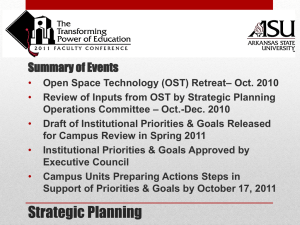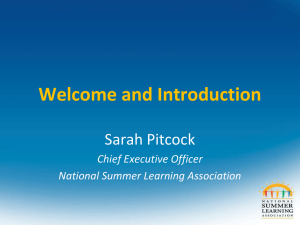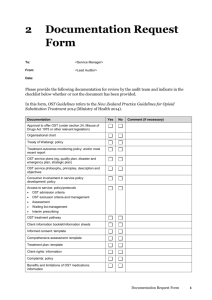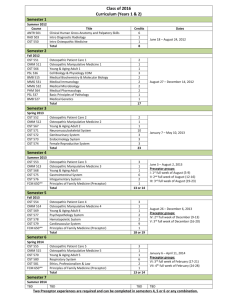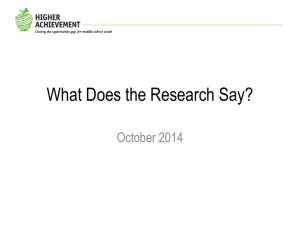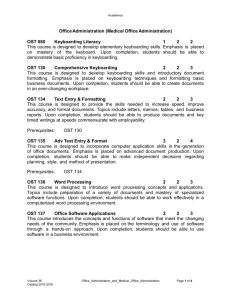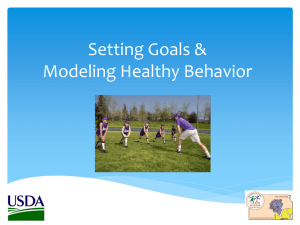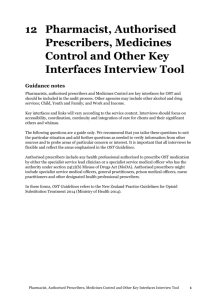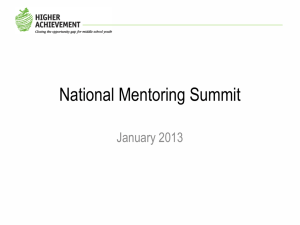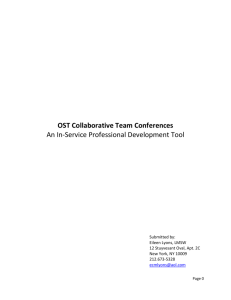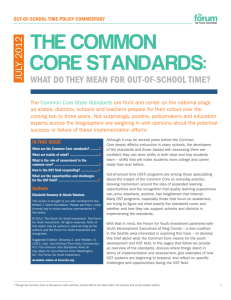Healthy Food in OST - Health Promotion Council
advertisement
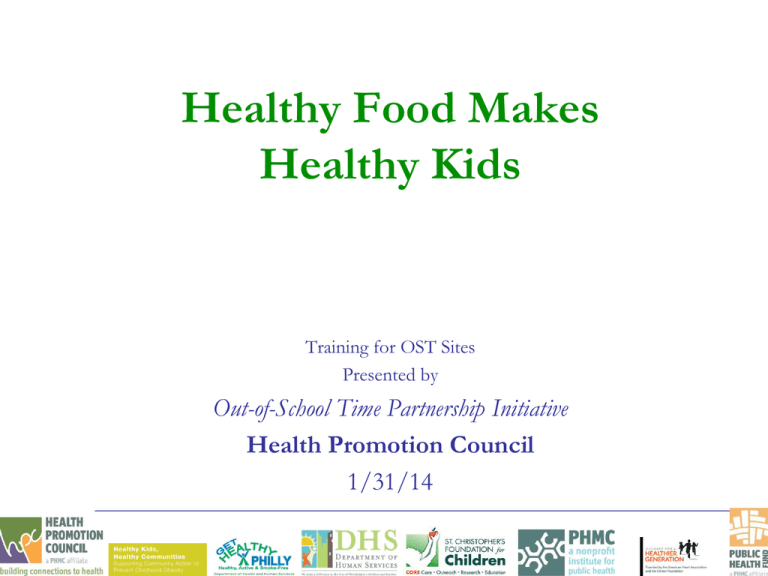
Healthy Food Makes Healthy Kids Training for OST Sites Presented by Out-of-School Time Partnership Initiative Health Promotion Council 1/31/14 Stand up if…… Why Out-of-School Time? Potential to improve the environment for 20,000 Philadelphia youth in OST programs every year Less structure than school day Youth get up to 3 meals a day away from home. 40% of youth are overweight or obese in Philadelphia. Ten Healthy Living Guidelines for OST • Reflect national best policies and practices to make it easier for youth to make healthy choices and maintain a healthy weight. • Guidelines improve the OST environment and reflect conditions that sites can control. Child Obesity in Philadelphia Northwest Oak lane, Olney, Logan, Germantown North West Center City South Southwest Far Northeast Frankford, Tacony Bridesburg, Richmond, Kensington, Improve the OST Environment to Prevent Overweight and Obesity Obesity does not guarantee health problems, but it: • Increases risk for 20 major diseases – Obese youth, ages 5-20 • 60% had one cardiovascular risk factor, like high blood pressure • 25 % had two cardiovascular risk factors F as in Fat: How Obesity Threatens America's Future 2011 http://healthyamericans.org/report/88/ Sugary Drinks Are You Pouring on the Pounds? (NYC Health Dept. Anti-Soda Ads) •Do You Drink 93 Sugar Packets a Day? •Man Eating Sugar •Man Drinking Fat PSA on Sugar-Loaded Beverages (Seattle & King County Public Health Dept.) •Glass of Sugar How Much Sugar in a Can of Cola? •Teaspoons of Sugar Six OST HealthyLiving Food and Nutrition Guidelines Aim to create a food environment where healthy food is eaten and served OST Healthy Living Food and Nutrition Guideline 1:*: OST program does not serve or allow sugary drinks Rationale: • Youth consume an average of 300 calories per day of sugar-sweetened beverages which is about 2 cans of soda or 20 teaspoons of sugar a day. * mandatory starting July, 2012 Each cube = 1 teaspoon sugar Sugary drinks http://www.youtube.com/watch?v=wUgSUMVa0 mA&feature=youtu.be Sugar sweetened beverage consumption: • contributes to excess weight • contributes to tooth decay • replaces milk consumption, and is associated with lower bone mineral density and increased fractures in girls • Do You Drink 93 Sugar Packets a Day? Image created by Tri-county Department of Health, Colorado GuidelineFN 2 *: Safe, fresh drinking water is available to youth at all times, indoors and outdoors, including field trips. • Water must be available for consumption, but does not replace snack or supper meal components. • Lots of resources in the toolkit OST Healthy Living Food and Nutrition Guideline 3: • Each OST provider adopts a comprehensive strategy to improve the food environment during OST, reflecting food service requirements, community perspectives, and good nutrition by: eliminating outside food, OR allowing food in the program that reflects recommended health and nutrition principles, for example, the Dietary Guidelines for Americans 2010. Dietary Guidelines 2010: Summary “A healthy eating pattern limits intake of sodium, solid fats, added sugars, and refined grains and emphasizes nutrient-dense foods and beverages - vegetables, fruits, whole grains, fat-free or low-fat milk and milk products,seafood, lean meats and poultry, eggs, beans and peas, and nuts and seeds.” Source: USDA Dietary Guidelines, 2010: Executive Summary. What should we serve? • • • • • • • Fruits and Vegetables Breads or crackers with whole grains Lean meats Low-fat milk, yogurt and cheese Beans and Rice Low-sugar items http://www.youtube.com/watch?v=ewdwo1Jr Wek&feature=youtu.be OST Healthy Living Food and Nutrition Guideline 4: A pleasant social environment is provided during scheduled meals and snacks, encouraging social interaction, conversation, and positive eating behaviors. Promoting Healthy Behaviors • Scheduled meals and snacks • Set clear expectations for mealtime behaviors – Socialization and conversations – Practice table manners – Clean-up – Don’t rush, enjoy mealtimes Promoting Healthy Behaviors • Offer regularly scheduled meals and snacks • Encourage youth to try new foods- don’t force • Trust children’s appetite– Don’t force them to eat or finish – Let them eat if they are still hungry • Never reward youth with foods, especially non-nutritious foods. Division of Responsibility, E. Satter OST Healthy Living Food and Nutrition Guideline 5: OST programs that offer nutrition education use credible nutrition materials from non-profit, federal, state or city agencies. Educational materials with food company logos or advertising are not to be used. Nutrition Education can be fun! Portion Distortion Do You Know How Food Portions Have Changed in the Past 20 Years? Portion Distortion OST Food and Nutrition Guideline 6: The OST program serves meals and snacks in a clean and safe environment, at proper serving temperatures, in compliance with the Philadelphia Department of Public Health Office of Food Protection requirements. Food and Nutrition Guidelines • Safe food handling is critical to prevent food borne illnesses, and the spread of infectious diseases. • Good hand washing habits should be taught and supported in OST programs. Website www.hpcpa.org/OST Toolkit Videos Educational resources Training Power Points Parent and Staff Handouts Geographic Information System Maps (GIS) Toolkit Healthy Food Breakouts • Planning a healthy celebration • Planning a fundraiser with healthy food • Engaging parents and families around healthy eating • Choosing a food policy that works for your site • Improving foods served in OST Technical Assistance • HPC As a result of today’s session • I plan to …………………..at my OST site Contact Information For more information contact: • Lauren Williams, Program Coordinator, Health Promotion Council lwilliams@phmc.org • Robin Rifkin, Program Manager, Health Promotion Council rrifkin@phmc.org Healthy Kids Healthy Communities OST Partnership

